|
|
|
Sort Order |
|
|
|
Items / Page
|
|
|
|
|
|
|
| Srl | Item |
| 1 |
ID:
163203
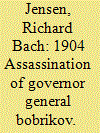

|
|
|
|
|
| Summary/Abstract |
The little-known assassination in 1904 of governor general Bobrikov, the Russian ruler of Finland, by the Finnish Senate clerk Eugen Schauman can be explained as an act of tyrannicide, anarchism, or terrorism. The article analyzes the question of which category this deed fits into and discusses the local and international background of one of the most significant acts of violence in Nordic history. It also postulates that around the time of Bobrikov’s murder in 1904 a fundamental shift occurred in the usage of the term “terrorism,” which began to replace “anarchism” as the standard signifier for violent crimes against civilization as well as against specific political grievances and institutions.
|
|
|
|
|
|
|
|
|
|
|
|
|
|
|
|
| 2 |
ID:
192474
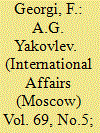

|
|
|
|
|
| Summary/Abstract |
THE Embassy of Russia in Israel has prepared an online exhibition, "A.G. Yakovlev: 10 Years of Service as Russian Imperial Consul General in the Holy Land," to honor the memory of outstanding diplomat and Orientalist Alexander Yakovlev (https://yakovlev-jerusalem.ru). The website has desktop and mobile versions. His biography, digitized archival materials, documents, and photos (some of them never before published) serve as an excellent illustration of the history of Russia's presence in the Holy Land in the latter half of the 19th century.
|
|
|
|
|
|
|
|
|
|
|
|
|
|
|
|
| 3 |
ID:
131516
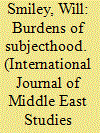

|
|
|
|
|
| Publication |
2014.
|
| Summary/Abstract |
This article analyzes the changing treaty law and practice governing the Ottoman state's attitude toward the subjects of its most important neighbor and most inveterate rival: the Russian Empire. The two empires were linked by both migration and unfreedom; alongside Russian slaves forcibly brought to the sultans' domains, many others came as fugitives from serfdom and conscription. But beginning in the late 18th century, the Ottoman Empire reinforced Russian serfdom and conscription by agreeing to return fugitives, even as the same treaties undermined Ottoman forced labor by mandating the return of Russian slaves. Drawing extensively on Ottoman archival sources, this article argues that the resulting interimperial regulations on unfreedom and movement hardened the empires' human and geographic boundaries, so that for many Russian subjects, foreign subjecthood under treaty law was not a privilege, but a liability.
|
|
|
|
|
|
|
|
|
|
|
|
|
|
|
|
| 4 |
ID:
122362
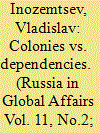

|
|
|
|
|
| Publication |
2013.
|
| Summary/Abstract |
It would be more logical to recognize only settler colonies as colonies per se and refer to all other results of expansion as dependencies. The loss of colonies is incomparably more dangerous for empires than the loss of dependencies. Trying to hold on to dependencies is meaningless, but to neglect the colonies is reckless.
|
|
|
|
|
|
|
|
|
|
|
|
|
|
|
|
| 5 |
ID:
053186
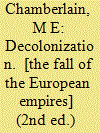

|
|
|
|
|
| Edition |
2nd ed.
|
| Publication |
Oxrford, Blackwell Publishers, 1999.
|
| Description |
xvi, 140p.Hbk
|
| Series |
Historical Association Studies
|
| Standard Number |
0631218041
|
|
|
|
|
|
|
|
|
|
|
|
Copies: C:1/I:0,R:0,Q:0
Circulation
| Accession# | Call# | Current Location | Status | Policy | Location |
| 042557 | 940/CHA 042557 | Main | On Shelf | General | |
|
|
|
|
| 6 |
ID:
089354


|
|
|
|
|
| Publication |
2009.
|
| Summary/Abstract |
A description of over five years spent living and working as a doctor in a remote area of Afghanistan, inhabited by Ismailis. The article explains how western medical practices in e.g. child nutrition had to be adapted to local beliefs and circumstances and describes the physical challenges of delivering effective medical services in daunting terrain.
|
|
|
|
|
|
|
|
|
|
|
|
|
|
|
|
| 7 |
ID:
178954
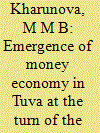

|
|
|
| 8 |
ID:
153475
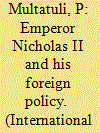

|
|
|
|
|
| Summary/Abstract |
DESPITE 100 YEARS that separate us from the time of Nicholas II, his role as the autocratic ruler of Russia's foreign policy remains practically ignored, let alone studied in any detail, by Russian and foreign historiography. In Russia, meanwhile, foreign policy was invariably the prerogative of the man on the throne, Nicholas II being no exception. According to Anatoly Ignatyev, "by law, tradition and convictions he was the sovereign ruler of Russia's foreign policy while he remained on the throne.
|
|
|
|
|
|
|
|
|
|
|
|
|
|
|
|
| 9 |
ID:
072747
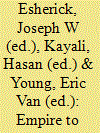

|
|
|
|
|
| Publication |
Lanham, Rowman and Littlefield Publisher, Inc., 2006.
|
| Description |
viii, 430p.Hbk
|
| Standard Number |
9780742540309
|
|
|
|
|
|
|
|
|
|
|
|
Copies: C:1/I:0,R:0,Q:0
Circulation
| Accession# | Call# | Current Location | Status | Policy | Location |
| 051415 | 909.8/ESH 051415 | Main | On Shelf | General | |
|
|
|
|
| 10 |
ID:
152306
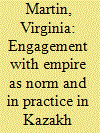

|
|
|
|
|
| Summary/Abstract |
This article offers an analysis of the Kazakh nomadic political culture of the 1820s–30s with focus on two issues: (1) service and loyalty as elements of Kazakh engagement with the Russian Empire; and (2) the place in local political practice of the regional administrative offices (diwans) created for Middle Horde Kazakh nomads in 1822. While Russia’s goal was ‘bureaucratization’ and creation of ‘order’ in the steppe, in part through directing nomads to engage with the diwan and its elected Kazakh officials, Kazakh political actors variously embraced and rejected formal structures, and continued to define relevant norms and practices of governance. The analysis challenges both statist and nationalist narratives of nineteenth-century Kazakh steppe history by acknowledging the complexities of the Kazakh nomadic experience of empire-building. The ultimate purpose is to suggest new approaches for interpreting historical change throughout the nineteenth century and into the twentieth.
|
|
|
|
|
|
|
|
|
|
|
|
|
|
|
|
| 11 |
ID:
185604
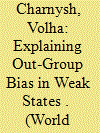

|
|
|
|
|
| Summary/Abstract |
Two dominant explanations for ethnic bias in distributional outcomes are electoral incentives and out-group prejudice. This article proposes a novel and complementary explanation for the phenomenon: variation in legibility across ethnic groups. The author argues that states will allocate fewer resources to groups from which they cannot gather accurate information or collect taxes. The argument is supported by original data on state aid from the 1891/1892 famine in the Russian Empire. Qualitative and quantitative analyses show that districts with a larger Muslim population experienced higher famine mortality and received less generous public assistance. The Muslims, historically ruled via religious intermediaries, were less legible to state officials and generated lower fiscal revenues. State officials could not count on the repayment of food loans or collect tax arrears from Muslim communes, so they were more likely to withhold aid. State relief did not vary with the presence of other minorities that were more legible and generated more revenue.
|
|
|
|
|
|
|
|
|
|
|
|
|
|
|
|
| 12 |
ID:
174166
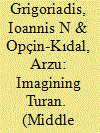

|
|
|
|
|
| Summary/Abstract |
While scholarly interest in the influence of Tatar intellectuals on Turkish nationalism has been strong, less attention has been paid to the interactions between Russian Azerbaijani and Ottoman Turkish intellectuals. This study applies theoretical tools developed by Benedict Anderson in the study of ethnic nationalism in the late Ottoman and Russian Empires. In doing so, this study focuses on the works of one leading intellectual from each side, Hüseyinzade Ali [Turan] and Mehmet Ziya [Gökalp]. Particular attention is paid to the concept of Turan, which they defined and elaborated as both a political ideal and a key element of the nationalist ideology they espoused through four poems they authored, two of which have homonymous titles. Their different views of the limits of the Turanian ‘imagined community’ and the political operationalization of the concept shed light on the development of ethnic nationalism in the declining Ottoman and Russian Empires. Ever since, Turan has become a significant symbolic conceptual tool that has fired the imaginations of Turkic nationalists (without, yet, having led to the establishment of a serious political movement).
|
|
|
|
|
|
|
|
|
|
|
|
|
|
|
|
| 13 |
ID:
073900


|
|
|
|
|
| Publication |
London, Routledge, 2006.
|
| Description |
xvii, 375p.Hbk
|
| Standard Number |
0415368359
|
|
|
|
|
|
|
|
|
|
|
|
Copies: C:1/I:0,R:0,Q:0
Circulation
| Accession# | Call# | Current Location | Status | Policy | Location |
| 051651 | 909.097670808631/DUD 051651 | Main | On Shelf | General | |
|
|
|
|
| 14 |
ID:
133078
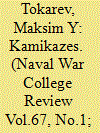

|
|
|
|
|
| Publication |
2014.
|
| Summary/Abstract |
Throughout history, despite the influence of Alfred Thayer Mahan's concepts, continental European and Asian navies have had a simple choice to make: either to create a balanced fleet to engage another balanced fleet at sea and defeat it in one or more "decisive battles" or to take an "asymmetrical approach," creating an "unbalanced" navy, able to prevent the enemy from achieving sea control and to keep one's own vital sea lines of communication (SLO Cs), if one has any, untouched by the enemy's naval forces.
|
|
|
|
|
|
|
|
|
|
|
|
|
|
|
|
| 15 |
ID:
173283
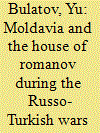

|
|
|
|
|
| Summary/Abstract |
ONE of the most important events in the development of Russian-Moldavian relations took place in the early 18th century in Istanbul where Russian Ambassador and resident of the Russian intelligence in Istanbul Pyotr Tolstoy met Dimitrie Cantemir, member of the Moldavian intellectual elite. According to the report compiled by the Russian diplomatic mission in the Turkish capital, Dimitrie Cantemir, born in 1673, graduate of the Academy of the Patriarchate of Constantinople, was a son of the Moldavian Hospodar (ruler) Constantin Cantemir. As a teenager, he had been separated, according to the "Oriental etiquette" and contrary to his will, from his parents and sent to Istanbul as a hostage at the court of the Turkish sultan.
|
|
|
|
|
|
|
|
|
|
|
|
|
|
|
|
| 16 |
ID:
001409


|
|
|
|
|
| Edition |
2nd ed.
|
| Publication |
London, Routledge, 1993.
|
| Description |
xix, 59p.Pbk
|
| Series |
Lancaster Pamphlets
|
| Standard Number |
0415102324
|
|
|
|
|
|
|
|
|
|
|
|
Copies: C:1/I:0,R:0,Q:0
Circulation
| Accession# | Call# | Current Location | Status | Policy | Location |
| 040966 | 947.083/WOO 040966 | Main | On Shelf | General | |
|
|
|
|
| 17 |
ID:
121017


|
|
|
|
|
| Publication |
2013.
|
| Summary/Abstract |
In this article, the author examines the debates over how the Russian Empire was to rebuild its navy after the disaster at Tsushima. While many plans were proposed, the debate came down to a contest of legitimacy between Nicholas II and individuals within the Duma, particularly A. I. Guchkov, the leader of the Octobrists. Nicholas II triumphed over his opponents, leading to an expensive and unfinished navy which diverted resources from other key areas, such as the manufacture of rifles and shells. These shortages played an important role in the Empire's defeat in World War I.
|
|
|
|
|
|
|
|
|
|
|
|
|
|
|
|
| 18 |
ID:
124420
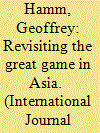

|
|
|
|
|
| Publication |
2013.
|
| Summary/Abstract |
The history of the Great Game in Asia, the contest between the British Empire and the Russian Empire for control of Central Asia, is dominated by popular writers attempting to uncover the "true" story of Rudyard Kipling's Kim, the story of the an orphaned Anglo-Irish son of a British soldier growing up in the streets and bazaars of British India. These books, often lacking any sense of historical context or a broader political narrative, tend to forego judicious historical analysis in favour of salacious adventure stories.
|
|
|
|
|
|
|
|
|
|
|
|
|
|
|
|
| 19 |
ID:
128698
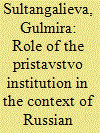

|
|
|
|
|
| Publication |
2014.
|
| Summary/Abstract |
The institution of pristavstvo was introduced in the Kazakh Steppe in the first decade of the nineteenth century. This institution had different meanings and functions, from an individually held position (e.g., a pristav to the kh?n of the Junior Horde in 1820; the pristavs who accompanied the Kazakh delegation to Saint Petersburg in the first half of the nineteenth century) to an administrative-territorial structure (e.g., the pristavstvo of the Senior Horde; the Mangyshlak and Zaisan pristavstvos). Though the political structure of the Russian empire had included institutions analogous to the pristavstvo, it was not a conventional component of the Russian administrative system. Studying the features of the pristavstvo institution in the territory of Kazakhstan and analysing the transformation of the pristav's function provide new insights on how the multi-ethnic Russian empire was managed. They will also help scholars to better understand the forms and methods the Russian authorities employed to manage their nomadic populations.
|
|
|
|
|
|
|
|
|
|
|
|
|
|
|
|
| 20 |
ID:
131407
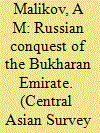

|
|
|
|
|
| Publication |
2014.
|
| Summary/Abstract |
This article examines the history of Russian conquest of Bukhara, with special reference to military and diplomatic aspects. From the beginning of the Russian advance into the region, relations between Russia and Bukhara had several peculiarities, but were characterized above all by mutual incomprehension. In my view, the main obstacle to the development of relations lay in the different understandings the two sides had of the nature of a peace agreement or treaty. In this paper I try to shed light on some questions arising from the military conflict between the Emirate of Bukhara and Russia in the interpretations of Russian military historians and Bukharan chronicles of the period. The focus is on a comparative analysis of the military capabilities of the Bukharan Emirate and Russia, the differences in weapons technology between these two powers, the links between the Russian advance in the region and the domestic and foreign policy of the Bukharan emir, Muzaffar, the situation in the emirate, and the use of Islamic ideology as a mobilizing force for the population in opposition to Russian expansion.
|
|
|
|
|
|
|
|
|
|
|
|
|
|
|
|
|
|
|
|
|